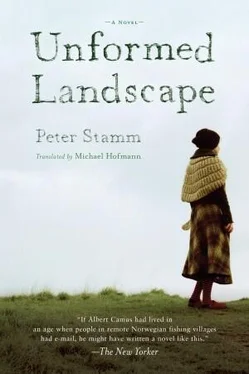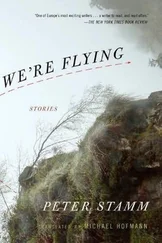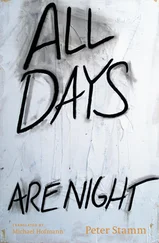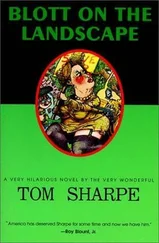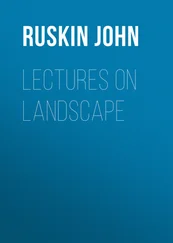Kathrine asked if anyone had been taken on in her old job. No, said her boss. She hadn’t given in her notice. He had asked for unpaid leave for her, first one month, and then a second. But if she wanted to start again before that time was up, that was fine by him. Head office had sent along this guy from Vadso, a real stickler, who didn’t get along with the Russians. He was staying at Svanhild’s, and would probably be relieved to be able to go home. “Tomorrow?”
“Thanks very much,” said Kathrine. “What about next Monday? I’ve still got lots of things to sort out.”
Then her boss asked if she was back together with Thomas, and immediately he apologized, it wasn’t any of his business of course, but…
“But what?”
“We wondered about your taking off just like that.”
“Hardly just like that.”
“You mean the letter?”
“I think we’ve said enough.”
Yes, said her boss, and got up. He said he was happy she was back with them, and she said she was too. They shook hands. He walked Kathrine to the door. When she was already outside, he asked, “Anyway, where did you go?”
“I’ll show you the pictures.”
On her way home, Kathrine thought about the journey from Paris to Boulogne. She had taken pictures out of the window of the train. Blurry landscapes, an overcast sky, now and then a few houses, a village. A narrow road that went along next to the track for a while, two women on horseback, a cemetery. But there were also things you couldn’t see in pictures: stopping in places whose names she’d never heard of. A place called Rue, which meant road. Then the landscape got very flat. The train crossed a river with hardly any water in it. When she went back the other way, it was full of brownish water. The floods, Christian had said.
Her free days went quickly. On the street, Kathrine was asked whether she had gone on holiday, and sometimes she showed people the pictures from her time away, and she barely recognized the places anymore. Once she saw Thomas coming toward her on the pavement. When he saw her, he turned and disappeared around the nearest corner. That night, his father called. Kathrine’s mother answered the phone. She was friendly in her submissive way, asked after the family, how they all were. Then Kathrine took the receiver out of her hand and asked him what was going on.
“I don’t know what Thomas has been saying,” she said. Then Thomas’s father talked for a long time. She listened, two or three times she said something. It’s his own fault. No. Yes. There are some things… I don’t want anything. He should just leave me alone.
“I don’t care if he wants a divorce or not,” she said. “He’s not my husband anymore. Doesn’t matter what it says on the piece of paper.”
Her mother stood next to her. Her alarmed expression made Kathrine furious. When she hung up, her mother started to cry.
“Stop that! You should be happy it’s all over.”
“But what will people say? Not yet thirty, and twice divorced.”
“He doesn’t want to get divorced. We don’t do divorce, his father said. We.” Kathrine laughed aloud.
“But think of Randy,” said her mother.
“I am thinking of Randy. And I’m not having him going up there anymore.”
“They want to have a birthday party for him.”
During that week, Kathrine and Morten didn’t meet, but Morten sent Kathrine an e-mail every couple of hours or so. He must have gotten hold of a French dictionary from somewhere, because he was writing things she didn’t understand that still made her laugh. In the evenings, they talked endlessly on the telephone.
“Was your grandmother really French?” Kathrine asked once.
“She was a Sami. So was my grandfather. My father still lived in a tent. He used to tell me about it a lot. How cold it was. When they built the house, he was five. And when they moved in, Father said, now we’re in Paradise. In the summer they went up in the mountains with the reindeer.”
“My father was a Sami as well,” said Kathrine. “Why didn’t you ever mention it?”
“My father had a cassette with songs. And if someone couldn’t sleep, he put it on. Voi, voi, voi…”
“Stop it,” she said. “Why didn’t you ever say?”
“What does it matter. Do you want me to go around in a red hat?”
The next day, Kathrine asked her boss about getting transferred, and Morten called all his friends in Tromso, to ask about work. On Saturday, he took the Hurtig Line boat. Kathrine came along to the harbor. Morten was the only passenger to join the boat.
“Finnmark Radio,” he said, “well, we’ll see. They’re not really looking for anyone. On the other hand, they liked my show. We’ll see.”
“When are you coming back?”
“When I’ve found a job. Shall I call you when I’m in Tromso?”
The next day, it was the service for Alexander. Kathrine went to church for the first time since her father’s death. The evening before, she had met the woman who had been the last person to see Alexander alive. Kathrine had asked her if she was coming, but the woman said, better not.
Her mother was coming along, even though she had never met Alexander.
“He was a fisherman,” she said, and Kathrine said, “We don’t know he’s dead.”
They took Randy with them. He sat between them, and was very quiet. The reverend talked about Jonah and the great fish.
“For thou cast me into the deep,” he said, “in the midst of the seas; and the floods compassed me about; all thy billows and thy waves passed over me. The waters compassed me about, even to the soul; the depth closed me round about, the weeds were wrapped about my head. I went down to the bottoms of the mountains; the earth with her bars was about me for ever; yet thou hast brought up my life from corruption.”
Kathrine looked at Alexander’s wife and his two daughters, who were sitting in the front row between Ian and Svanhild. Presumably, they didn’t understand a word. The girls shifted about. They had thin braids, tied with colored ribbons, and they wore clothes that looked as if their mother might have sewn them herself.
Then the organ played, and the preacher said, “Overnight we are created, and overnight we are unmade again.”
Kathrine couldn’t remember what the minister had spoken about at her father’s funeral. She had felt paralyzed the whole time, and had only been able to cry when they were back at home. “In the night Alexander Sukhanik left our village, and he has not been seen since,” said the minister. “We do not know where he is. But wherever he is, he is with God, and God is with him. Because no sheep is ever lost from His flock.”
Kathrine didn’t believe what the minister was saying, and yet his words were comforting to her. Perhaps it was enough if he believed it, or Alexander’s wife believed it, or Ian or Svanhild. Perhaps it was enough if the minister just spoke the words. Perhaps it was enough that they were all assembled here, that they were thinking of Alexander, that they would remember him later, and this day and this hour.
After the service, the minister and Alexander’s wife and Ian stood by the door, and everyone went past them, and shook the minister’s hand and the wife’s. Kathrine thought of saying something, but in the end she didn’t, and she just shook hands with the woman.
“My husband was a fisherman as well,” said Kathrine’s mother. Ian whispered something into the ear of Alexander’s wife, and she nodded and smiled.
After a week, Morten still wasn’t back. On Sunday it was Randy’s birthday. Kathrine hadn’t finally had the heart to put a stop to the party at Thomas’s parents. She took Randy there. She stopped at the garden gate. Behave nicely, she said, don’t eat too much, and say thank you for your presents. She watched Randy running across the big garden, and she thought he’s small for his age, but he’ll grow. As she was on the point of going, Thomas’s father stepped out of the house.
Читать дальше
